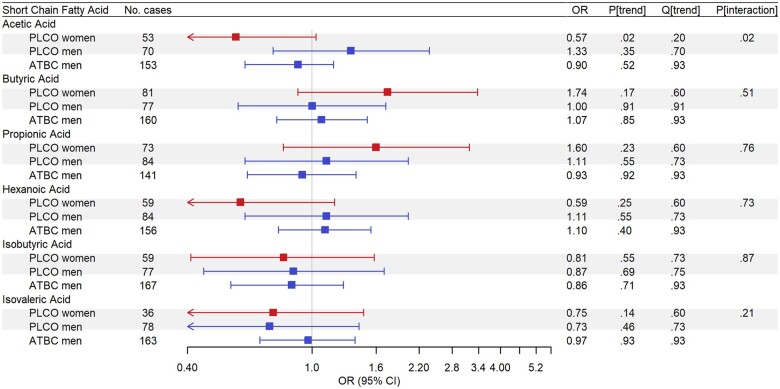Figure 3.
Odds ratios (ORs) for short-chain fatty acids (SCFA) with colorectal cancer (CRC) risk, estimated by means of conditional logistic regression to account for matching, for individuals in the highest quartile (Q4) of SCFA concentrations compared with those in those in the lowest quartile (Q1), based on the SCFA distribution in controls for either Prostate, Lung, Colorectal, and Ovarian Cancer Screening Trial (PLCO) or Alpha-Tocopherol, Beta-Carotene Cancer Prevention Study (ATBC). Red squares show odds ratios for women, blue squares show odds ratios for men, and grey shaded boxes highlight analyses run in the PLCO Cancer Screening Trial cohort. Analyses in PLCO were adjusted for age at baseline (years), body mass index (BMI; kg/m2), smoking status (never, former, current), family history of CRC (no, yes), diabetes diagnosis (no, yes), alcohol drinker (no, yes), alcoholic intake (average number of drinks per day), hours spent in vigorous physical activity (none, <1 h/wk, 1 h/wk, 2 h/wk, 3 h/wk, ≥4 h/wk), total unprocessed red meat (g/d/1000 kcal), total processed meat (g/d/1000 kcal), whole grains (oz/d/1000 kcal), total energy (kcal/d), education (high school graduate or less, some college or post high school training, college graduate or postgraduate), and hormone replacement therapy status (women only; never, current, former). Analyses in ATBC were adjusted for age at baseline (years), BMI (kg/m2), smoking intensity (cigarettes per day), diabetes diagnosis (no, yes), average number of alcoholic drinks per day, frequency of physical activity in leisure time (none, <1/wk, 1–2/wk, ≥3/wk), total unprocessed red meat (g/d/1000 kcal), total processed meat (g/day/1000 kcal), whole grains (oz/d/100 kcal), total energy (kcal/d), and education (less than elementary school, some junior high school, completed junior high school, some senior high school, senior high school graduate).

